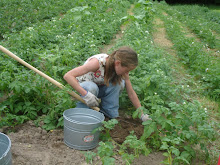
Thanks for taking a look at Eener’s Farm, here are some important C.S.A. details:
A C.S.A. definition: If you are unfamiliar with C.S.A.s (or just want to brush up on them) here is the United States Department of Agriculture (USDA) definition:
In basic terms, CSA consists of a community of individuals who pledge support to a farm operation so that the farmland becomes, either legally or spiritually, the community’s farm, with the growers and consumers providing mutual support and sharing the risks and benefits of food production. Members or shareholders of the farm or garden pledge in advance to cover the anticipated costs of the farm operation and farmer’s salary. In return, they receive shares in the farm’s bounty throughout the growing season, as well as satisfaction gained from reconnecting to the land. Members also share in risks, including poor harvest due to unfavorable weather or pests.
How Eener’s C.S.A. works: I’ll pick produce and eggs and pack your box within 24 hours of delivery. After I deliver the boxes to the two co-ops (other pick up points may also be available) you would simply drop by one of the co-ops and pick up your assigned box (your box will have your name on it). Boxes will be delivered on Wednesdays. Next you would enjoy the contents of your box and look forward to next Wednesday’s delivery upon which you will bring your empty box in and exchange it for a full box.
Share prices: Full shares are $500/season. Half shares are $250/season. Full shares are designed for families and half shares would work for couples or single folks. Our season runs from the first week in June until the last week in October.
Regarding risk: Obviously there’s a lot of risk involved in farming: weather and pests sums it up and they can come in a myriad of different ways. I protect myself against most instances of total garden failure by planting a wide variety of plants and also different strains of these varieties. I also employ some tried and true home remedies for pests. While I’m not totally immune (a well-placed tornado could wipe out the whole works for example) there are some safety nets in place.
Regarding eggs: My chickens are free range and basically act like free range chickens meaning egg production is not necessarily constant nor consistent. When chickens are left to their own devices they lay a lot of eggs during good weather that would be favorable to raising chicks (like April through July). When it gets hot some may drastically reduce the number of eggs they lay while others just stop altogether. Conversely, my chickens also lay fewer eggs when the weather gets cold and there’s less day light, in October it starts to really dwindle.
The bottom line here is I can’t promise shareholders a full dozen eggs every week however, it’s likely they will receive a fair amount of eggs through June and possibly July, after that it’s up to the chickens.
Regarding “what do I do with this?”: I’ll be writing a blog for every delivery explaining what’s in the box, recipe ideas, farm news and other tidbits.
How Do I Sign Up for Eener’s C.S.A.?
Please fill out the form below (it may be easier to copy and paste it into a word document) and send to Eener at Eener’s Farm N12449 220th St. Boyceville, WI 54725 or e-mail it to eenermachine@gmail.com
At least $20 is due at sign up time. The rest is due by Halloween. Please make checks out to Eener’s Farm or Renee Bettendorf. Thanks!
Your Name:
Your Address:
Your Phone Number:
What size share would you like?
Where will you be picking your boxes up at?
I’ll see you June 3rd! Please let me know if you would like to stop by for a farm tour beforehand. Also, read my blog to keep abreast of farm news.
For questions please call (715)643-2803 or email eenermachine@gmail.com


